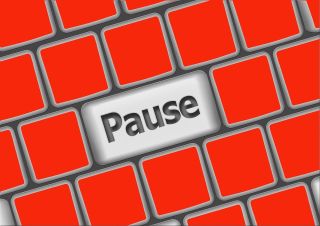EMOTION REGULATION- Decrease Reactivity: Pause and Tune Into Internal Experience. Emotional reactivity involves the frequency and intensity of emotional arousal.

KEY POINTS-
- Emotional reactivity can be influenced by chronic pain, fatigue, and other factors.
- Emotional regulation involves noticing your feelings, pausing, and practicing slow breathing.
- To activate the relaxation response, you can focus on exhaling twice as long as you inhale.

Emotional reactivity refers to the frequency and intensity of emotional arousal. It includes the threshold and ease with which someone becomes emotionally aroused and the intensity of emotional experiences.
For example, someone who becomes irritable very quickly and easily and experiences high irritability may be emotionally reactive.
For me, feeling chronically fatigued and experiencing chronic pain can lead me to feel irritated and emotionally reactive. Feeling fatigued or in pain and acting calmly and nonreactive can be challenging. I am continually working on this and do not always do well. I may talk in a terse and frustrated tone of voice or make critical comments about very minor things when my fatigue or pain is high.
Emotional regulation is the ability to have control over your emotional state. Usually, this involves using skills that decrease the intensity of emotions. For example, emotional regulation may involve actively noticing my feelings and practicing slow breathing when I feel fatigued and irritated so I do not act unhelpfully when irritable.
Self-Reflection Exercise
It can be helpful to reflect on your possible emotional reactivity. The more aware you are of your emotional experience, the more options you have for doing something differently as helpful.
- Do you tend to feel emotions strongly? If yes, do you feel certain emotions more strongly than others?
- On a scale of 0 to 10, with 10 being extreme, what is your average emotional intensity level?
- Do you tend to get upset, frustrated, or disappointed easily?
- Do your emotions typically linger for long, or do they move through you fairly quickly?
- What tends to trigger strong emotions in you? Are there common or frequent triggers?
- How do you typically react or behave when experiencing strong emotions?
- Has the intensity of your emotions, or how you respond to them, caused any difficulties in your life? For example, in your relationships.
- How would you like to respond when feeling strong emotions? Is there a more helpful way of responding than you typically do?
Pause and Tune Into Internal Experience
Pausing is the ability to slow down and stop. Sometimes, this may mean physically stopping what you are doing at the moment or taking a few intentional, slow breaths. Pausing slows you down physically and emotionally and can help you notice your experience at the moment so you can make an intentional decision about a helpful way to act versus reacting automatically in a way that may not be helpful.
What I think of as learning to respond vs. react. Responding implies an element of thoughtfulness, of slowing down long enough to ask yourself, “What am I experiencing right now, and what would be most helpful to me at this moment?
Before you practice regulating your emotions, you have to know how you are feeling in the moment and how intense your emotions are. You can practice tuning into your moment-to-moment internal experience by pausing and asking yourself:
- What thoughts are going through my mind? Practice noticing any specific thoughts you are having by completing the sentence, “I am having the thought that…”
- What feelings are here? Practice noticing and naming whatever feelings are present in the moment. For example, anxiety, anger, sadness, frustration, joy, happiness, excitement, boredom, etc. Then, rate how intense the emotions feel on a scale of 0 to 10 scale, with 0 being not intense at all, and 10 being extremely intense.
At times, simply the process of naming emotions can reduce their intensity. It may be helpful to name the emotion silently to yourself, say it out loud, or write it down. It is useful to use a feeling list as a reference when noticing and naming your feelings, as having a list of different emotion words may help you reflect on your experience in a more nuanced way versus automatically defaulting to certain emotion words that you are familiar with yet may not fully capture your experience. You can search “feelings list” online for examples. Remember that it is common to feel multiple emotions at once, including those that may seem contradictory.
- What physical sensations are here right now? How does my body feel at this moment? Do I feel physical tightness, soreness, heaviness, etc.?
Once you have paused and tuned into your internal experience, practicing slow breathing can decrease the intensity of emotions and nervous system activation and allow you to feel more control and choice over how you behave.
Lengthen Your Exhale Breathing Exercise
The exhalation part of the breath is like a brake in a car; it slows your nervous system down. One type of relaxation breathing is to lengthen your exhale intentionally. If, for example, you naturally inhale to about a count of three, you would practice exhaling slowly to a count of five or six. In general, it can be helpful to exhale about twice as long as you inhale.
To practice this type of breathing, I encourage you to stop what you are doing a few times a day, or whenever needed, and take slow breaths, focusing on lengthening your exhale. It may be helpful to count to yourself as you inhale and exhale. You may slowly count 1,2,3 as you inhale and then slowly count 1, 2, 3, 4, 5, and 6 as you exhale. If you get distracted, gently return your attention to your breathing.
It can be challenging to slow down, tune into your internal experience, and intentionally breathe when emotions are high. So, don’t wait to practice. The more you practice these exercises when you are feeling generally calm, the more likely you will remember to use them when emotional intensity increases, and the more effective they will be.
- Questions and Answers
- Opinion
- Motivational and Inspiring Story
- Technology
- Live and Let live
- Focus
- Geopolitics
- Military-Arms/Equipment
- Beveiliging
- Economy
- Beasts of Nations
- Machine Tools-The “Mother Industry”
- Art
- Causes
- Crafts
- Dance
- Drinks
- Film/Movie
- Fitness
- Food
- Spellen
- Gardening
- Health
- Home
- Literature
- Music
- Networking
- Other
- Party
- Religion
- Shopping
- Sports
- Theater
- Health and Wellness
- News
- Culture

